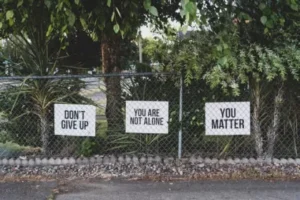What are the Stigmas Surrounding Mental Health, and What can we do to Combat Them?

Photo: Unsplash
According to the National Alliance on Mental Illness (NAMI), one in every five US adults in the United States experiences mental illness. With the growing number of those mentally ill, it’s surprising how little society truly knows about mental health. The stigmas surrounding mental health and against people with mental illness have been in part to blame and are still a prevalent problem to this day. Here, we’ll discuss a few of them, what they are, and what you can do to help fight them.
Societal Stigmas
Today’s world is extremely fast-paced, with videos, messages, and pictures all able to be on global display in seconds. Unfortunately, not everything online is positive. News stories, movies, and TV shows that show mentally ill people as lazy, hostile, or unable to function independently deepen people’s misunderstanding, and the use of offensive language takes a severe toll on those with mental illnesses, making them ashamed of who they are or even avoiding treatment not to be put under the same pain others are.
How to Fight It
Just as there’s negativity online and in our societies, there’s positive. It doesn’t take much to make a significant impact. Something as simple as talking to people about mental health awareness or posting about it can work wonders at reversing society’s cruel picture of mental health and helping those struggling know they belong.
Institutional Stigma
It’s not just in the public consciousness that mental health is seen as unfavorable. People can be penalized for having mental illnesses, like being discriminated against in their places of work because of their mental illness, having poor mental health insurance coverage, and having less access to mental health facilities that provide the care they desperately need. In places where everyone should be treated fairly and with respect, people with mental illnesses can still feel left out.
How to Fight It
Advocating for updates to policies that support mental health equality not only within the workplace but also in our government is a great way to combat this stigma. Advocating for or implementing programs on mental health awareness could also help people understand those who are mentally ill and what to do should they require assistance. Finally, opening up access to mental health treatment is necessary, whether through helping establish new mental health centers or advocating for our leaders to recognize mentally ill people and their needs.
Internalized Stigma
This is probably one of the most potent of the three, not because it is an obstacle in our external environment, but because it’s within our minds. Internalized stigmas are challenging to deal with because, at times, you may not notice it until it’s too late. Many opinions, biases, and stereotypes we form come from the images we have in our heads of a person. This can lead people to, at times, unknowingly make assumptions about those who are mentally ill based on what they might have seen online. This also can lead to people with mental illnesses feeling less confident about themselves, as they may see themselves as monsters, only worsened by society. And once these images have lodged themselves deep into our heads, it’s a challenge to rectify them.
How to Fight It
Mindfulness is critical to combating this stigma. The next time you see an exaggerated representation of a mentally ill person, notice how they’re portrayed and how your mind reacts to it. Make a conscious effort to remind yourself that that one person is not an accurate portrayal of a mentally ill person. And when interacting with one, recognize when your brain starts to make assumptions and shut them down. It will be a struggle at first, but over time, you’ll be able to see mentally ill people as regular people, not the dysfunctional outcasts society so often makes them out to be.
The path to changing your beliefs about mental health is daunting and could be a very long fight. However, once you’ve managed to do this, you can truly put your all into championing equality for people with mental illness while having peace of mind.
Never Miss News